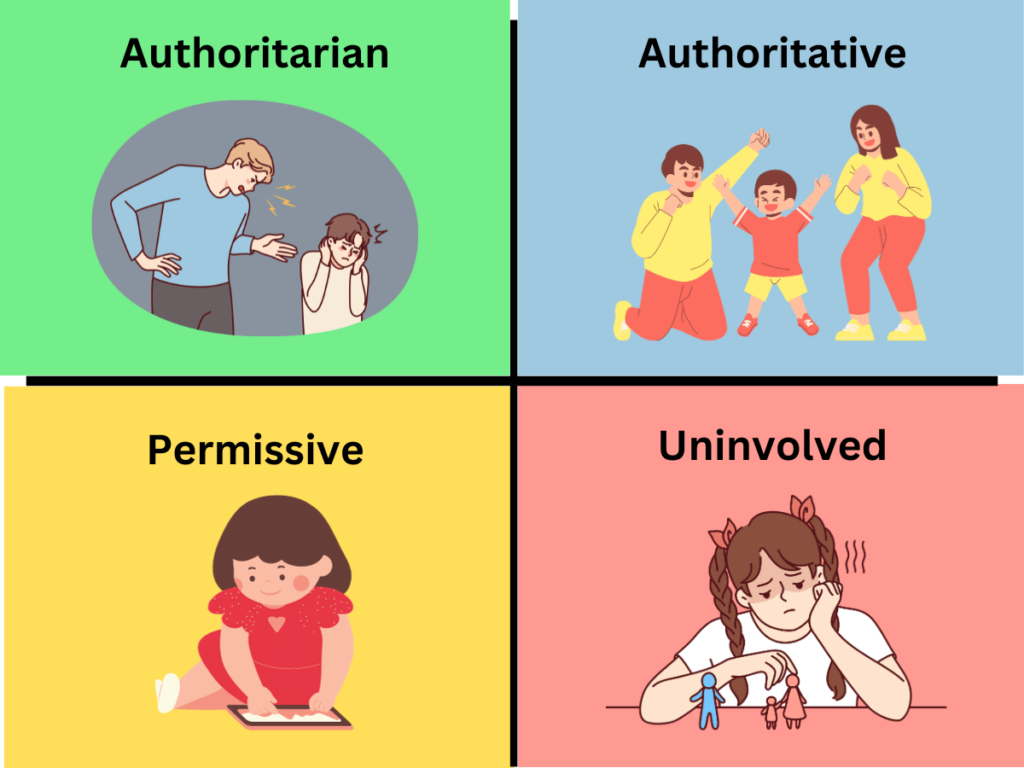What Are the 4 Types of Parenting Styles?
All parents have their own approach to child-rearing, but psychologists have also identified distinctive parenting styles that can impact child development. Today, psychologists suggest that there are four major parenting styles: As you might imagine, these different parenting styles are marked by distinctive behavior and communication patterns. These parenting styles can play an important role…

All parents have their own approach to child-rearing, but psychologists have also identified distinctive parenting styles that can impact child development. Today, psychologists suggest that there are four major parenting styles:
- Authoritarian parenting
- Authoritative parenting
- Permissive parenting
- Uninvolved/Neglectful parenting

As you might imagine, these different parenting styles are marked by distinctive behavior and communication patterns. These parenting styles can play an important role in early childhood development and development in later childhood, adolescence, and even into adulthood.
Each style can leave a mark on how a child develops, so parents need to understand how their styles might impact their children. By learning more about parenting styles, you can better understand your strengths and weaknesses as a parent.
What Are Parenting Styles?
While developmental psychologists have long been interested in learning more about the effect of parental behavior on children, pinpointing exact cause-and-effect relationships between these variables is not always easy.
Researchers have discovered four distinctive patterns of parental behavior known as parenting styles. Each of these types of parenting can have an impact on children’s health and development.
It was during the 1960s that psychologist Diana Baumrind performed research on pre-school age kids, utilizing parent interviews, observations, and naturalistic observation to study different dimensions of parenting. Using her observations, she concluded that parents differed on a few essential factors, which she identified as:
- Disciplinary strategies
- Expectations of maturity and control
- Warmth and nurturing
- Communication styles
Based on her research, Baumrind described three different parenting styles. Later research by Maccoby and Martin led to the addition of another parenting style. Today, researchers recognize four distinct parenting styles.
Authoritarian Parenting
The authoritarian parenting style is characterized by a very high level of control with little communication and warmth.
Authoritarian parents tend to seem militant, expecting a great deal of self-control and obedience from their children. They have strict rules but offer little instruction or feedback to their children.
Signs you might be an authoritarian parent:
- Do you have a lot of rules that you expect your children to understand and follow without question or explanation?
- Are there harsh consequences if your children disobey or break your rules?
- Do you rarely express warmth or affection for your child?
- Do you believe that children should be seen and not heard?
- Do you rarely consider your child’s feelings?
If you can answer yes to some or most of these questions, then you might be an authoritarian parent.
The bad news is that this parenting style is often associated with lower self-esteem and a lack of self-control in children. Because kids never learn to set their own limits and receive very little feedback from their parents, they never develop the skills they need to self-regulate.
Authoritative Parenting
The authoritative parenting style is characterized by high expectations, but unlike the authoritarian style, these parents provide a great deal of support and guidance for their children.
Authoritative parents set rules, but they also explain these rules and set clear and fair expectations. When kids make mistakes, parents offer consistent discipline but also make sure that their children know why they are in trouble and how they can avoid such trouble again.
Signs that you might be an authoritative parent:
- Do you expect a lot of your kids but also provide the support they need to meet your expectations?
- Do you listen to your kids and offer guidance and assistance?
- Is having a positive relationship with your children important?
- Are you consistent about how you enforce the rules of your household?
If you can answer yes to some or most of these questions, then you probably have an authoritative parenting style.
The good news is that the authoritative parenting style is typically identified as the best approach to parenting. Kids who grow up with authoritative parents tend to be more self-regulated and independent as they grow older. Authoritative parents also tend to raise happier and more successful children.
Why is authoritative parenting superior to other styles? Because these parents have high but reasonable expectations of their kids while also providing the support and communication kids need to be successful.
Kids can see that their parents’ rules are fair, and they internalize these standards over time. Children are then able to develop an internal sense of right and wrong as well as the self-regulation skills that they need to control their behavior.
Permissive Parenting
The permissive parenting style is characterized by low expectations but high levels of responsiveness. These parents let their children do whatever they please with little guidance.
There are few rules to follow and no consequences when the few existing rules are broken. Permissive parents are, however, very warm and loving. Their kids may feel that their parents are more of good friends rather than parental figures.
Signs that you might be a permissive parent:
- Are there few, if any, rules you expect your kids to follow?
- Do you feel more like your child’s friend than his or her parent?
- When you do set rules, you don’t follow through and enforce any consequences.
- Do you feel like it’s better for your kid to learn from experience rather than offering any guidance or advice?
If you can answer yes to some or all of these questions, then the chances are good that you are a permissive parent.
The negative news is that this style tends to result in children who have little motivation and self-control. Kids raised by permissive parents tend to have lower self-esteem, struggle academically, and experience more behavioral problems. These kids also tend to struggle with authority and report feeling less happy than their peers.
Uninvolved Parenting
Uninvolved or neglectful parenting is characterized by both low expectations and low responsiveness.
In some cases, uninvolved parents are simply unconcerned with their kids yet still provide for their most basic needs. In extreme cases, these parents may be outright neglectful, ignoring even the simplest needs that their children may have.
Signs of uninvolved or neglectful parenting:
- Do you rarely see your child?
- Do you frequently not know where your child is or who he is with?
- Do you never ask your child about how their life is going?
- Do you ever forget to feed, bathe, or otherwise care for your child?
If you have answered yes to any of these questions, then you may be in danger of being an uninvolved or neglectful parent.
Unfortunately, kids raised by such parents may not fare well in life. Kids raised by such parents tend to do poorly in all life domains, including socially, academically, and emotionally.
How Do Parenting Styles Affect Children?
Parenting styles can affect many areas of child development, including cognitive, social, and emotional well-being.
- Cognitive development: Kids raised in supportive environments are more likely to be flexible, independent thinkers. Children who lack adequate support may struggle with critical thinking, creativity, and academic performance.
- Social development: Authoritative parenting styles are more likely to produce children with good social skills and strong interpersonal relationships. Children raised in permissive or uninvolved households may struggle with boundaries and attachment issues.
- Emotional development: Authoritarian parenting produces children with strong emotional intelligence who are good at regulating their own emotions. Children raised by authoritarian parents may struggle with self-expression, while those from permissive or uninvolved households may struggle with self-control and poor self-esteem.
- Mental health: Authoritarian parenting is associated with positive mental health outcomes, while those raised in with other parenting styles may struggle with mental health challenges.
Assessing Parenting Styles
As you read more about parenting styles, you might start analyzing your own relationships with both your parents and children. In some instances, you might even feel that your own parenting skills might be lacking.
However, it is important to remember that while the descriptions of these styles make them seem very discrete, many different factors influence a child’s relationship with caregivers.
Factors that can influence how parents interact with their children include:
- The temperament of the parent
- The child’s personality
- Situational variables
- Relationships with other family members
One single parenting style may seem “ideal,” but all kids are unique, and what they need from their parents may differ depending upon their children’s needs. What may seem comforting to one child may seem stifling and oppressive to another.
Large-scale twin studies suggest that genetics and the environment play about a 50/50 role in shaping child development. How people parent makes up an important part of that environmental aspect of influence.
Most Common Parenting Styles
While the exact prevalence of each parenting style isn’t clear, some research suggets that the authoritative style tends to be the most common, while uninvolved is the least common.
According to these statistics:
- 46% to 49% are authoritative parents
- 23% to 26% are authoritarian parents
- 18% to 20% are perimissive parents
- 8% to 10% are uninvolved parents
Can You Change Your Parenting Style?
You might immediately notice as you read these descriptions that you might not always fit perfectly into one style.
Sometimes you are more authoritative, but you might be more permissive or authoritarian in other situations. This is perfectly normal and quite common.
You might also recognize that you tend to exhibit more of one style while your spouse exhibits another. In such situations, it pays to consider how you respond to your children and work on developing a consistent approach to parenting and discipline.
While you might naturally tend toward a different style, making a conscious approach to be a more authoritative parent can pay off. Your children will then be better able to reap the benefits of a more authoritative parenting approach.
Modern Parenting Styles
In addition to the four core parenting styles described by Baumrind and other researchers, there are a number of other parenting approaches that have been identified in recent years. Some examples include:
- Helicopter Parenting: Helicopter parents are overly involved and tend to hover over their children, closely monitoring and directing their activities to ensure success and safety.
- Tiger Parenting: Tiger parents are characterized by high demands for academic achievement and strict discipline. They emphasize hard work, academic excellence, and extracurricular success.
- Free-Range Parenting: Free-range parents encourage independence and self-reliance in their children by allowing them more freedom to explore and make decisions on their own within safe boundaries.
- Attachment Parenting: Attachment parenting is centered on creating emotional bonds between parents and children by engaging in parenting practices such as baby-wearing, co-sleeping, and responsive caregiving.
- Conscious Parenting: Conscious parenting involves being aware and present in the moment, making intentional and mindful choices in parenting, and fostering a deep connection with the child.
- Simplicity Parenting: Simplicity parenting emphasizes creating a simpler, less cluttered environment for children, with a focus on quality over quantity in terms of toys, activities, and experiences.
- Positive Parenting: Positive parenting involves using positive reinforcement and open communication to encourage desirable behaviors in children, promoting a supportive and nurturing environment.
- Lawnmower Parenting: Lawnmower parents strive to remove obstacles and challenges from their children’s paths, clearing the way for smooth and obstacle-free experiences.
- Gentle Parenting: Gentle parenting emphasizes empathy, understanding, and respectful communication, aiming to guide children with kindness and positive reinforcement rather than punishment.
- Slow Parenting: Slow parenting encourages a more relaxed and unhurried approach to parenting, prioritizing quality time, meaningful experiences, and allowing for a slower pace of life for both parents and children.
Sources:
Baumrind, D. (1991). The influence of parenting style on adolescent competence and substance use. The Journal of Early Adolescence, 11(1), 56–95. https://doi.org/10.1177/0272431691111004
Benson, JB, Marshall, MH. Social and Emotional Development in Infancy and Early Childhood. Oxford: Academic Press; 2009.
Farrant, B. M., Devine, T. A. J., Maybery, M. T., & Fletcher, J. (2012). Empathy, perspective taking and prosocial behaviour: The importance of parenting practices. Infant and Child Development, 21(2), 175–188. https://doi.org/10.1002/icd.740
Matejevic, M., Todorovic, J., & Jovanovic, A. D. (2014). Patterns of family functioning and dimensions of parenting style. Procedia – Social and Behavioral Sciences, 141, 431–437. https://doi.org/10.1016/j.sbspro.2014.05.075
Pong, S., Johnston, J., & Chen, V. (2010). Authoritarian parenting and asian adolescent school performance: Insights from the us and taiwan. International Journal of Behavioral Development, 34(1), 62–72. https://doi.org/10.1177/0165025409345073





